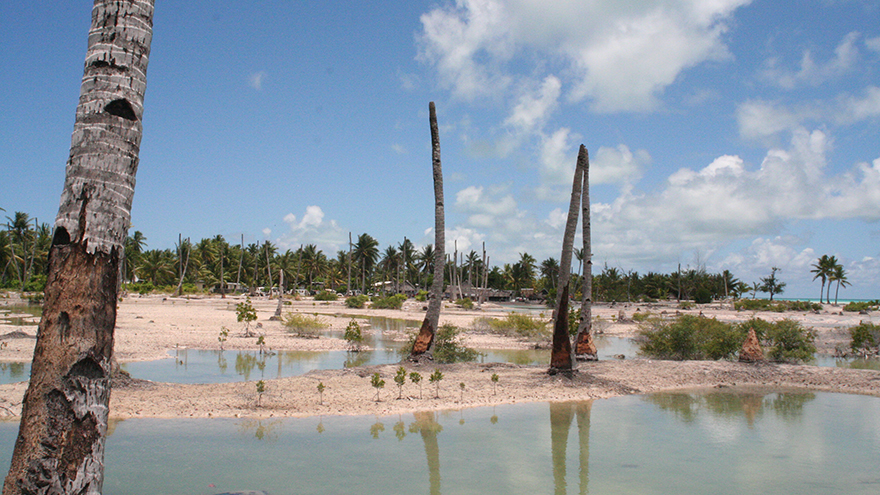Global Risks: Climate Change Mitigation and Adaptation Failure in Kiribati
Estimated reading time: 3 Minutes

This blog post is based on an opinion piece written by Master of Public Policy student Briar Thompson: "Global Risks: Climate Change Mitigation and Adaptation Failure in Kiribati" published by the Pacific Islands Society.
[caption id="attachment_7443" align="alignnone" width="880"] Kiribati Image source: Australian Government Department of Foreign Affairs and Trade[/caption]
Kiribati Image source: Australian Government Department of Foreign Affairs and Trade[/caption]
Every year since 2005, the World Economic Forum in Geneva has published a Global Risks Report, analysing the major challenges facing the world. This year, failure to mitigate climate change was listed 5th out of 31 risks, followed at 6th by a greater incidence of extreme weather events. Thousands of miles away, residents of the small islands of Kiribati did not need to read the WEF report to learn that climate change is a serious threat to the world. Living on atolls where most land is less than 3-4m above sea level, they know firsthand how vulnerable they are and what is at stake if we fail to mitigate global climate change.
Small island developing states like Kiribati cannot mitigate or adapt to climate change alone, nor can they address the risks presented by a possible failure of international efforts. Climate change, and global failure to adequately respond to it, presents a clear security issue in the Pacific. Not just human security, but also a test of our regional capacity and resilience and of global governance.
The full text is available from http://pacificislandssociety.org/wp-content/uploads/2014/09/Briar_Thompson_Security_Scholars_090814.pdf
[caption id="attachment_7443" align="alignnone" width="880"]
 Kiribati Image source: Australian Government Department of Foreign Affairs and Trade[/caption]
Kiribati Image source: Australian Government Department of Foreign Affairs and Trade[/caption]Every year since 2005, the World Economic Forum in Geneva has published a Global Risks Report, analysing the major challenges facing the world. This year, failure to mitigate climate change was listed 5th out of 31 risks, followed at 6th by a greater incidence of extreme weather events. Thousands of miles away, residents of the small islands of Kiribati did not need to read the WEF report to learn that climate change is a serious threat to the world. Living on atolls where most land is less than 3-4m above sea level, they know firsthand how vulnerable they are and what is at stake if we fail to mitigate global climate change.
Small island developing states like Kiribati cannot mitigate or adapt to climate change alone, nor can they address the risks presented by a possible failure of international efforts. Climate change, and global failure to adequately respond to it, presents a clear security issue in the Pacific. Not just human security, but also a test of our regional capacity and resilience and of global governance.
Bottom lines
- Climate change is a security issue. By threatening water supply, food security, shelter, and subsequently health and livelihoods, climate change is a threat to human security, and for small islands states, to state security. In the long term it may threaten state sovereignty.
- Kiribati cannot adapt alone. Kiribati’s government and people have implemented many adaptation programs focused on building coastal protection, improving water collection and storage, and ensuring food security. More can be done but this will require technical assistance from outside Kiribati.
- Focusing on relocation could stall action. Although Kiribati has developed a 'migration with dignity' strategy, relocation is a last resort, and focusing on relocation risks diverting international attention away from the investment needed for adaptation measures. Furthermore, Kiribati would not be the first country to relocate its people due to climatic or environmental changes. To say so gives the impression that we have managed to hold off the worst of climate change. This is as misleading as the idea that islands are ‘sinking’, distracting from the fact that climate change, as an impact multiplier and accelerator, will make the islands unable to sustain life long before the ocean covers their surfaces.
- Regional cooperation is crucial for providing locally specific adaptation solutions, supporting labour migration schemes, building up education programmes, and continuing to provide humanitarian and military assistance. However, a stronger regional response would require ramping up these efforts and backing Kiribati's calls for more ambitious and urgent mitigation and adaptation efforts.
- Climate change is a test of global governance. While there is more that Kiribati can do, what is really needed is international leadership and cooperation. If we cannot work together to address climate change, what hope is there for other forms of cooperation on other global risks? If the Paris 2015 climate conference becomes yet another chance to protect and safeguard short term GDP and national priorities by blocking mitigative remedies that might threaten them, it will not only be Kiribati that suffers. The hope placed in international cooperation will be shown as futile, the capacity of our leaders to reach agreements limited, and the ‘international community’ we uphold as the answer to the global risks we face broken. This realization will have far wider reaching security implications than only determining the future of Kiribati.
The full text is available from http://pacificislandssociety.org/wp-content/uploads/2014/09/Briar_Thompson_Security_Scholars_090814.pdf
